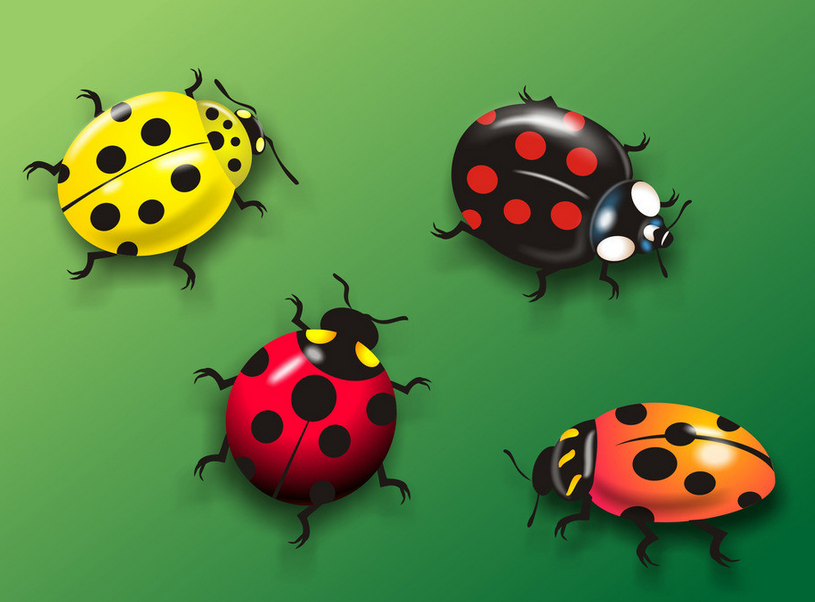Invasive Ladybird Has Biological Weapon. Nature May 16th,2013
配备有生化武器的侵略性瓢虫 《自然》2013年5月16日
Ladybirds around the world are in danger from an invader that inadvertently wipes out its competitors using a biological weapon.
世界各地的瓢虫都因为一个侵略者而处于危险之中。这个侵略者使用生物武器在不经意间就消灭了它的竞争对手。
The interloper is the harlequin ladybird (Harmonia axyridis), one of the world's most invasive insects. From its homelands in central Asia, H.axyridis was introduced to Europe and North America to control aphids. Since then, however, it has become a serious pest that has put native ladybird species under threat by outcompeting or even eating them.
这个侵略者就是异色瓢虫,它是世界上最具攻击性的昆虫。异色瓢虫来自中亚,为控制蚜虫而被引入欧洲和北美。自那以后,它就因为战胜本地瓢虫物种或是吃掉它们而对本地瓢虫造成了威胁,成为了害虫。

Entomologist Andreas Vilcinskas of Justus-Liebig-University in Giessen, Germany, suggests that the harlequin's success partly hinges on the presence of a single-celled parasite that he and his colleagues found living inside the ladybirds. The parasite does no harm to the harlequin, but if it infects other ladybird species, such as the native seven-spot ladybird, it invariably kills them.
德国吉森尤斯图斯-李比希大学的昆虫学家安德列亚斯·威尔科林萨克斯认为,异色瓢虫的胜利在于一种单细胞寄生虫的出现。安德列亚斯·威尔科林萨克斯和他的同事们发现,这种寄生虫可以存活于瓢虫体内。它不会对异色瓢虫造成伤害,但是却会感染其他瓢虫,例如本地的七星瓢虫,并通常会杀死它们。
Some scientists had previously thought that the harlequin owed its success to haemolymph, a toxic antibacterial chemical found in its blood. Harmonine allows the harlequin to resist certain diseases and to poison native ladybirds that eat its eggs. However, Vilcinskas and his team found that high concentrations of harmonine do not kill seven- spot ladybirds—but a dose of the harlequin's haemolymph does. When Vilcinskas and his colleagues looked at the harlequin's haemolymph under a microscope, they found the culprit: a microsporidian parasite. These exist in the eggs and larvae of all harlequin ladybirds, but in a dormant and apparently harmless state.
先前,一些科学家认为,异色瓢虫的胜利在于血淋巴。血淋巴指的是异色瓢虫血液中有毒的抗菌化学物质。它可以使异色瓢虫抵抗某些疾病,毒害吃它的卵的本地瓢虫。但是,威尔科林萨克斯和他的同事们发现高浓度血淋巴并不会杀死七星瓢虫,少量的血淋巴反而会杀死瓢虫。之后,他们用显微镜观察异色瓢虫的血淋巴时发现了真凶:一种微孢子寄生虫。这些寄生虫可以在异色瓢虫的卵和幼虫中存活,且处于休眠和显然的无害状态。
Other ladybirds are not so lucky. Ladybirds often eat each other's eggs and larvae, so by consuming invading harlequins, native species could contract the fatal parasitic infection in the wild. And there could be other reasons for the harlequin's success. For example, it is highly resistant to a fungal disease that kills native species.
但是,其他的瓢虫就没有异色瓢虫这么幸运了。瓢虫经常会吃掉对方的卵和幼虫。若是本地瓢虫吃了具有侵略性的异色瓢虫,它们就会在野外被致命的寄生虫所感染。当然,异色瓢虫的胜利还有其他的原因。比如,真菌疾病会杀死本地瓢虫,但是,异色瓢虫却对真菌疾病有很强的抵抗力。













